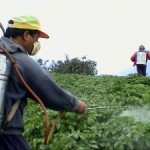For the first time since the U.S. Dept. of Agriculture ( USDA ) began testing for pesticides in produce in 1991, it has examined baby food; specifically green beans, pears and sweet potatoes. The results were revealed in a press release (1) by the Environmental Working Group (EWG), a non-profit, consumer-protection organization headquartered in Washington D.C.
Green beans prepared as baby food tested positive for five pesticides including two organophosphates, namely methamidiphos, found in 9.4 percent of samples, and acephate, found in 7.8 percent of samples. When the EWG analyzed baby food samples back in 1995, these two organophosphates were also found to be present and in similar concentrations.
Pears prepared as baby food showed significant and widespread contamination. Fully 92 percent of the pear samples tested positive for at least one pesticide, and 26 percent of samples were found to contain 5 or more pesticides. Of particular concern was the detection in three samples of the pesticide iprodione, which the U.S. Environmental Protection Agency (EPA) has categorized as a probable human carcinogen. According to the EWG, iprodione is not registered with the EPA for use on pears and therefore its presence in this popular baby food is a violation of FDA regulations and of the Federal Food, Drug, & Cosmetic Act.
According to Andrew Weil, MD, Founder and Director of the Arizona Center for Integrative Medicine and a renowned commentator on natural health and wellness, “Federal testing of pesticide residue in baby food was long overdue, as infants are especially vulnerable to toxic compounds. Now that it has begun, the results are highly disturbing. It is bad enough that baby food contains pesticides at all; the fact that pears contain a likely human carcinogen is an outrage. Parents should purchase organic baby foods, or better yet, prepare their own by putting organic foods through a simple hand-turned food mill (search the internet for “baby food mill”). It is vital that an infant’s developing brain and nervous system receive only uncontaminated, nutrient-dense foods.”
Fortunately, sweet potatoes, a Clean Fifteen crop, had virtually no detectable pesticide residues when prepared as baby food.
The extent of pesticide contamination revealed by the USDA’s baby food tests is of major concern and highlights the need for a more rigorous monitoring program and for the EPA to seriously restrict pesticide exposure for all Americans and especially infants.
Pesticides in Drinking Water
In 2010, the USDA analyzed samples from 12 community drinking water systems that use surface water such as reservoirs, lakes and rivers as their water sources. A total of 65 pesticides or their metabolites were found in tests of 284 water samples taken after treatment and every sample contained the toxic herbicide atrazine or its metabolites. The herbicides 2,4-D and metolachlor were detected in more than 70 percent of the samples and six other pesticides were found in at least half of the samples. Open sources of water are particularly susceptible to pesticide contamination because of runoff from fields where crop spraying has taken place. Increased public awareness of this contamination should spur the need for stricter regulation of pesticide use and encourage greater adoption of organic farming methods.
Reference
1. Environmental Working Group: The 2012 Shopper’s Guide to Pesticides in Produce. http://www.ewg.org/foodnews/press/
© Christopher J. Jones, M.Sc., Ph.D.





Comments on this entry are closed.